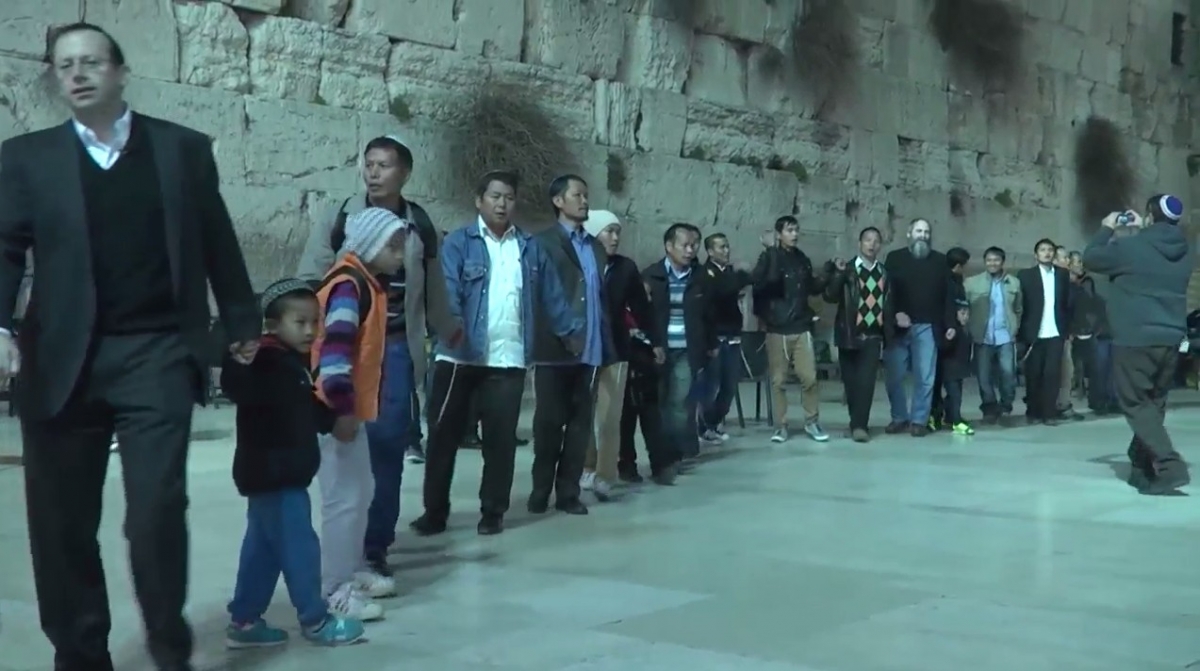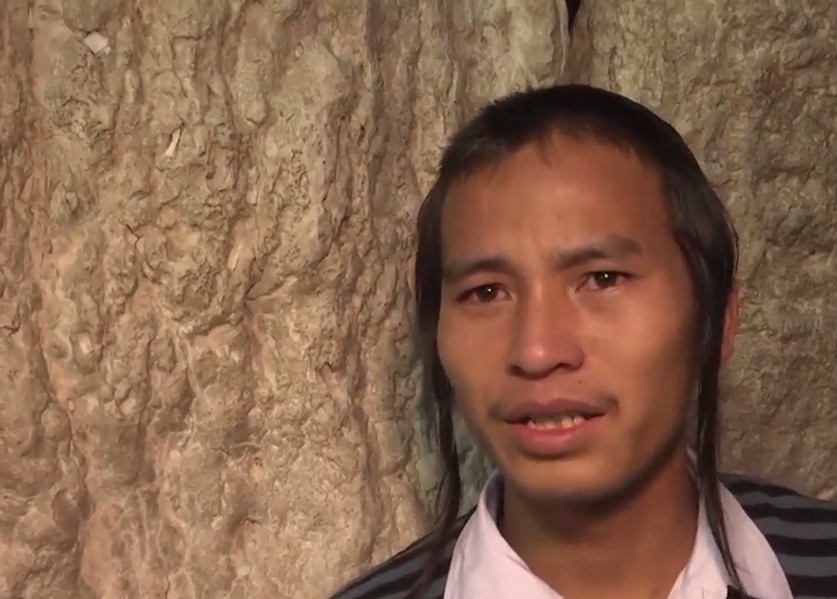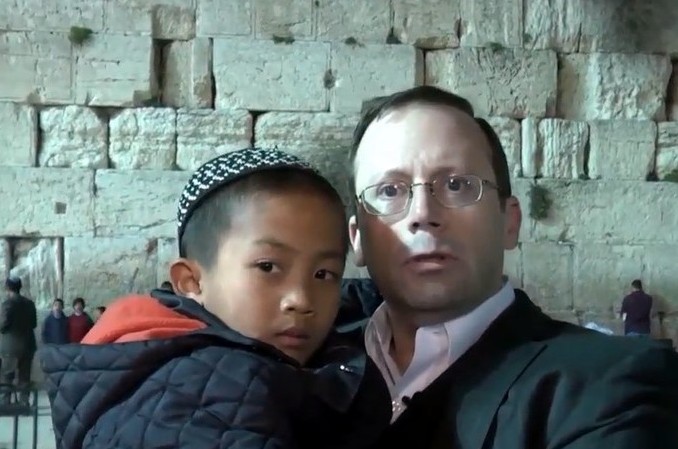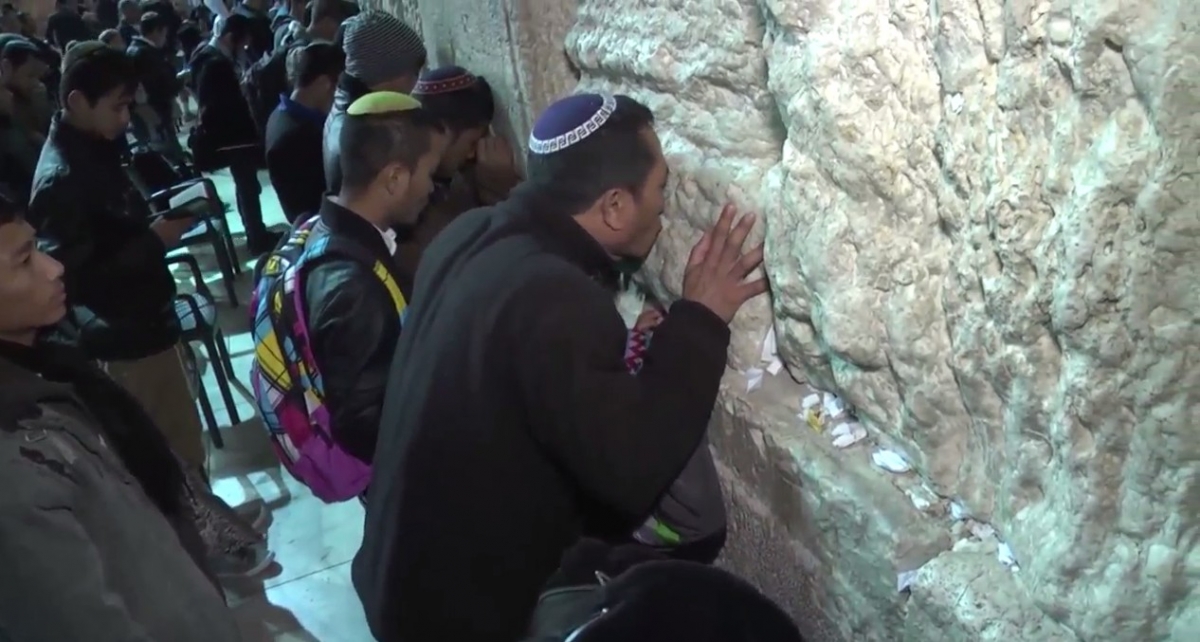Am Yisrael Chai: The Lost Tribe Fulfills the Dream to Pray at the Kotel
The Lost Tribe Comes Home: Members of the Bnei Menashe tribe recently ascended from Manipur, India, to fulfill their dream of praying at the Western Wall. Now, they hope for the rest of their tribe, still in exile, to make it to the Holy Land. Michael Freund, chairman of the "Shavei Israel" organization, is determined to complete the task. "They feel they have the great merit of being the generation of redemption." An interview.

With tears in their eyes, a strong excitement in their hearts, and a song of love for Jerusalem: the lost tribe fulfills a 2,000-year dream – to reach the Western Wall and touch the sacred stones. The Bnei Menashe, who recently ascended from Manipur, India, fulfilled their dream and reached the last remnant of the First Temple built by King David, and upon which the Third Temple is expected to be built. "I dreamed of reaching the Kotel, praying and kissing the stones for many years," Gideon Haokip said with tears in his eyes. "It's truly like a dream. It's just amazing, as if I entered my dream." Yosef Tungnung added: "Since our childhood, we've seen the Kotel in pictures on the wall, and now we have the opportunity to pray there." Michael Freund, chairman of the "Shavei Israel" organization and the man who opened the window for remote communities and helped them ascend, asked the arrivals to pray for the ascent of about 7,000 tribe members left in India, whose only wish is to ascend to the Holy Land.
According to the tradition passed down for generations among the tribe members, the Bnei Menashe tribe are descendants of the Ten Lost Tribes exiled from Israel at the end of the First Temple period, about 2,600 years ago. Currently, their number is estimated at 7,000. The Bnei Menashe, who identify themselves as descendants of the Ten Lost Tribes, are part of the Kuki-Chin-Mizo tribes from the states of Mizoram, Assam, and Manipur in northeastern India, on the Myanmar-Burma border. In recent years, after a period of stagnation, the government resumed the immigration of "the lost Jews" gradually. Thus, the number of community members in the country reached about 3,000, residing throughout the land - from Maalot in the north, through Afula and Kiryat Arba, to Sderot in the south. Freund is determined to bring them all to the country. "They deserve to be here."
A Crumpled Envelope Arrived 16 Years Ago
So how did it all start? Like the most wonderful stories, also here: a single crumpled envelope, sent to the Prime Minister's office, reached the right hands. This opened the door for the ascent of the Jews, who for hundreds of years have zealously kept Jewish traditions and customs. The envelope, containing an appeal from the tribe's representatives, reached Michael Freund's hands 16 years ago, and since then he has delved into the project, dedicated to fulfilling the rights of these Jews to reach Israel and be part of the Jewish people.
 Tribe members dancing at the Kotel square (Photos: Courtesy of Shavei Israel)
Tribe members dancing at the Kotel square (Photos: Courtesy of Shavei Israel)"I myself ascended about 20 years ago from New York," says Freund, chairman and founder of "Shavei Israel." "In 1996, after Benjamin Netanyahu was elected Prime Minister for the first time, I worked at the Prime Minister's office as Deputy Director of Public Affairs. In the spring of 1997, we received a crumpled orange envelope from northeast India, containing an appeal from the leaders of the Bnei Menashe community, begging to return to the land. Later, I discovered that the Bnei Menashe had begun writing as early as the days of Golda Meir, and perhaps even David Ben-Gurion, but they never received a response. I read the letter, and at first, I thought it was completely bizarre. I couldn't believe there was such a thing - a lost tribe in northeast India. On the other hand, the letter was very sincere and genuine. In the next step, I met with representatives of the tribe who came to the country. I saw that they truly wanted to be Torah-observant Jews and to live here in the land. I told myself that if someone wants to join us so much and is serious, then why put a stumbling block in front of him? Moreover, when I visited northeast India and learned about their customs and traditions, I was convinced that they truly are our lost brethren, that they are descendants of one of the Ten Lost Tribes. I realized there was a mission here, and I set myself to it."
After successfully navigating the bureaucratic maze, Freund managed to secure an annual quota of about 100 immigrants per year from the Interior Ministry. The idea was for them to undergo a conversion process with the Chief Rabbinate and a process of integration into Israeli society.
From what you know, what are their traditions, how did they live in India?
"According to their tradition, their ancestors were exiled 2,700 years ago by Assyria and they wandered, reaching China and lived there until a cruel king rose who persecuted them and stole their holy books. He forced them to flee south and west until they reached the area where they currently reside. About a hundred years ago, the British, the first Westerners, came to northeast India, among them many soldiers and missionaries, and they were astonished to discover an entire population that believes in one God and lives according to the written Torah. They kept Shabbat, kashrut, family purity, and even established cities of refuge and continued with sacrifices. Of course, not everything they did was according to the Shulchan Aruch, but they definitely did what they remembered. It's worth noting that most of the tribe converted to Christianity, and to this day, 94 percent of the northeast Indian population are Christians, but there was a hard core that refused to abandon the ways of the ancestors. In 1948, when they heard about the establishment of the Jewish state, it rekindled their desire to return here. We've heard stories from many elders that there were families who packed suitcases and began to walk west on foot because they believed that the Messiah would soon come and take them home. Unfortunately, this did not happen, but it did kindle in them the desire to ascend. Over the years, all the observance of the commandments came from within them, it wasn't someone from outside who put a kippah on their heads and convinced them to behave this way. In 1976, they established an umbrella organization in Manipur uniting all the synagogues and communities in the state. When they made contact with Western Jews, they adopted Orthodox Judaism. To this day they live like this. Anyone who travels there and wanders through the villages sees them with kippah and tzitzit, and the women with head coverings. It's not a show but a way of life."
According to Freund, Bnei Menashe are not entitled to come to Israel under the Law of Return, as the law goes back two generations. That is, according to the law, anyone with a Jewish grandfather is entitled to immigrate and naturalize, but the connection of Bnei Menashe is not from two generations ago, but hundreds of years further back. "That is why in 2005, Rabbi Shlomo Amar, being the first to Zion, determined that Bnei Menashe are descendants of the Jewish people, but they must undergo conversion due to the disconnection between them and the Jewish people. In other words, collectively, they are descendants of the Jewish people, but each one must undergo individual conversion, and this is what is happening now."
How many have already arrived and undergone conversion?
"So far, we have already had about 3,000 people arrive and undergo conversion by the Chief Rabbinate. There are still 7,000 more who all want to come to Israel. In 2007, we brought a group of 230 people, but afterwards, the government decided to freeze the aliyah. For five years, we fought to renew the aliyah, and thank God in 2012 the government unanimously decided to renew bringing them. We were allowed to bring 275 as a pilot. They ascended at the beginning of 2013, and everything went smoothly, thank God. In October 2013, another decision was made – to approve 900 Bnei Menashe to ascend. Since the decision was made, we brought about 660 people in 2014, which is the largest number of Bnei Menashe immigrants ever to arrive in one year."
How do they react when they see Israel for the first time?
"I had the privilege to accompany them on the plane, and it was amazing. Many of them burst into tears when they see the landscape of Eretz Yisrael for the first time or the beach. When they get off the plane, they usually burst into song and dance. It is a very unique and exciting moment. For them, it is a dream come true and a closing of a historical circle. Many of them say they regret that their parents and grandparents did not live to see this. They feel they have a great privilege, that they were fortunate to be the generation of redemption."
In November, a group of 250 tribe members arrived in Israel, who about three weeks ago visited the Kotel for the first time. "It was an emotional experience," Rabbi Freund describes, "everyone has heard about the Kotel, seen it in pictures, and dreamed of approaching those stones that have absorbed so many tears over the generations. They dreamed of the moment when they could approach those stones and pour out their hearts before the Creator of the Universe."
 "It's amazing, as if I entered my own dream," said the Bnei Menashe immigrants
"It's amazing, as if I entered my own dream," said the Bnei Menashe immigrantsWhen they arrived in Jerusalem, it must have been a powerful experience.
"You need to understand that in the Bnei Menashe culture, like in many other Eastern cultures, it's not so common to express emotions publicly. They keep their feelings to themselves and don't share so quickly the experiences they are going through. That means when you see they have tears in their eyes, you know something powerful is happening inside them. When I stood beside them at the Kotel and saw so many of them with tears flowing, I understood just how strong this experience is for them and how real the encounter with the Kotel is. It was a historic meeting, as the sons are returning to their borders, but it was also a powerful spiritual encounter. Some of them told me that besides personal requests, they thought of two things: to thank Hashem for granting them the merit to return and be next to the Kotel. Secondly, everyone prayed for the aliyah to continue, and that everyone would merit to arrive."
Was there a particularly empowering moment?
"The strong moment I experienced was when they all gathered to pray Maariv, and the group was joined by charedim, chasidim, national religious people, and other Jews, with the chazan being from Bnei Menashe. This is a Jew who ascended only in November and completed the conversion process. It was very powerful because here we see before our eyes the fulfillment of the prophets' vision, not only about the gathering of Jews but also the additional stage - the return of the Tribes of Israel. I saw the Tribe of Judah and Menashe praying together at the Kotel."
They Love the Land of Israel, They Stay
Bnei Menashe are Torah-observant Jews. Among them are those who have received ordination as rabbis, scribes, and students in colleges and universities. "They integrate successfully into society," says Freund, "More and more marriages are seen between community members and Israelis or veteran immigrants from other parts of the world."
How do you help them integrate into the community?
"Together with the Ministry of Absorption, we built an absorption model by which we try to settle them in not too large groups, and disperse them across several cities. That is, when we bring 250 people, which in total is 50 families, we try to settle them in several cities such as Acre, Nahariya, and Migdal HaEmek. The goal is for them to meet other people and get to know Israeli society, and thus they will learn to speak Hebrew and unite with all."
 Michael Freund, Chairman of Shavei Tzion Organization
Michael Freund, Chairman of Shavei Tzion OrganizationThe aliyah to Israel is just the beginning of Bnei Menashe's story in the Land of Israel. "We accompany them spiritually and materially, find accommodations for them, and provide vocational training courses. We care for Torah studies and various scholarships with the prime goal that each one can be independent and earn a living with dignity. I don't want them to rely on the system or anyone else. The most important thing is that each one can go out to work and live with dignity."
Freund works voluntarily ("My family and I cover about half of the organization's budget, and the rest I raise in the USA and Europe"). When asked about his connection to the matter, he says: "I do it because I love these people and feel that it is right. As much as we strengthen them, in the end, they strengthen us."
Freund is aware of the conjectures that arise: could it be that their motivation to come to Israel is only economic? And maybe when they have the opportunity, they will leave?
"They are all Torah-observant Jews, which proves how their desire is rooted in a spiritual historical motivation rather than an economic one," Freund replies, "If the motivation were only economic, then once they received their identity cards, they could take off the kippah and abandon their religious lifestyle. The fact is that everyone continues to live as mitzvah-observant Jews. Their motive is indeed spiritual. They have a desire to return to the Land of Israel and a spiritual yearning to be part of the Jewish people."

A Blessing for the People of Israel
"Out of 3,000 Bnei Menashe who ascended, I know of only two cases of people who left the country. It involved women who married immigrants from other countries, and they chose to return to their homeland. They don't leave the country, they are very attached to Israel. As an immigrant, I can say that the absorption process is not all pink, no matter where you come from. There are, for example, gaps in mentality. In India, there is a lot of respect for elders, and suddenly they come here and the father needs to rely on his young son who knows the language better than him. This can lead to tension because respect for the elder decreases. It is important for me to emphasize that not everything is rosy, and we must be realistic, but we are trying to deal with any problem that arises."
Thousands of Bnei Menashe in India yearn to reach the Land of Israel. Freund, for his part, is determined to bring the last of the lost Jews. "We have a group of about 250 people we intend to bring in the coming months," he says. "I am determined to bring them to Israel. We will continue to act until the last one boards the plane and arrives at Ben Gurion Airport. I don't intend to abandon them there. Bnei Menashe is a blessing to the people of Israel. They are imbued with Zionist motivation, observant of Torah and mitzvot, and they come to strengthen the state and contribute to it. They deserve to be here."

